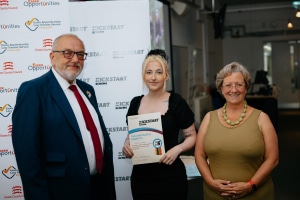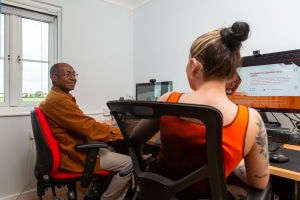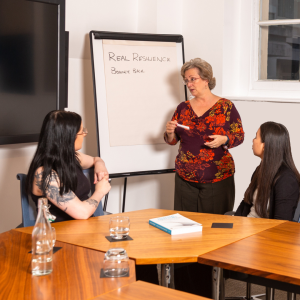ADHD: Navigating Challenges and Finding Support
My Personal Journey
By Sophie Holly
 I’m Sophie, and I’m going to share with you some insight into my personal journey as an employee living and working with Attention Deficit Hyperactivity Disorder (ADHD). As any person living with neurodiversity will tell you, it’s never a straightforward or linear journey. It comes with a lot of trial and error, ups and downs, and a lengthy process of finding what works for you. However, having the support of your colleagues and employers will be beneficial to anyone like myself.
I’m Sophie, and I’m going to share with you some insight into my personal journey as an employee living and working with Attention Deficit Hyperactivity Disorder (ADHD). As any person living with neurodiversity will tell you, it’s never a straightforward or linear journey. It comes with a lot of trial and error, ups and downs, and a lengthy process of finding what works for you. However, having the support of your colleagues and employers will be beneficial to anyone like myself.
I didn’t know I had ADHD until I was 23. I went to my GP to seek help with terrible sleeping issues that I’d always had but were now interfering with my new job. Upon delving deeper into my sleeping problems, I was urged to have an assessment for ADHD, and as it turned out I ticked all the boxes. Growing up I struggled at school especially when it came to focus and deadlines. I struggled terribly with my emotions among other things. There is so much I can pinpoint from my childhood years that now makes so much sense to me. Even into adulthood, I felt lazy, disorganised, and forgetful, and that really impacted how I performed at work. When you’re neurodiverse, you start to understand how the world really is built for neurotypical people, especially the working world, and that is extremely challenging.
Adapting to Work with ADHD
Before finding my current job I hadn’t worked in a little while, so when I finally entered a structured work environment I found it very difficult to adapt. Challenges soon presented themselves. I was easily overwhelmed. Sticking to deadlines was difficult no matter how important they were. It’s worth noting that many with ADHD don’t tend to see importance as easily as others, we see novelty, so it makes prioritising important tasks very hard! I would worry that the way I was would hold me back. However, seeking out strategies and coping mechanisms tailored to my own needs helped me navigate the workplace more effectively.
One of the most significant coping mechanisms for me has been using different planning methods. I rely heavily on to-do lists, calendars, and reminders to keep me on track. Breaking down tasks into smaller, more manageable steps helps me stay focused and prevents me from feeling overwhelmed. What I’ve learned is that, for me, there isn’t one solid fix to being productive and staying on task 100% of the time. It’s worth having multiple methods to lean on depending on the day you’re having. Whether you’re having a more motivated day, or you’re stuck in the dregs of executive dysfunction.
I still get very easily overwhelmed, some small tasks look like mountains to me. This applies to both home and work life and can make getting started all the more difficult. This can be a frequent occurance, but I’ve learned to take breaks and come away from my desk to do something else if I need to. The work will get done, but it won’t be done well if I’m stressing about it too much.
The Importance of Colleague Support
One the most helpful aspects of my journey has been the support I’ve received from my employer. Through my diagnosis and since then, I’ve had incredible understanding and support from my employer. Alison has had to navigate and adapt as much as I have.
Another game-changer my employer made was offering flexible work arrangements. Having the option to work virtually or adjust my hours has been crucial for me. I struggle with routine, habit and structure. My employer gives me the freedom to work within my means and find my own routines. This has been so helpful and has improved my productivity by miles.
 Clear communication and expectations have also been essential. My employer takes the time to provide me with detailed instructions and deadlines, ensuring that I know exactly what is expected of me. As someone who struggles following vague instructions, I need as much detail and information as possible. Asking for more clarity and receiving it has been great for my work.
Clear communication and expectations have also been essential. My employer takes the time to provide me with detailed instructions and deadlines, ensuring that I know exactly what is expected of me. As someone who struggles following vague instructions, I need as much detail and information as possible. Asking for more clarity and receiving it has been great for my work.
But perhaps most importantly, my employer has done a fantastic job of making me feel valued and respected at work. We both have vastly different minds and ways of thinking. She appreciates that I might approach something differently, and actually, it makes for some great creative collaboration between us. She’s invested in sourcing out helpful tools for me. She spoke with me to find ways of working that would benefit us both and expanded her knowledge of ADHD to gain a full understanding of how to accommodate me.
A Positive Outcome
Looking back on my journey, I’m grateful for how far I’ve come. I am also proud of how hard I have worked to improve. While living with ADHD has its challenges, I’ve learned to embrace it for what it is. In a world built for neurotypical people, it’s a relief to have found a workplace willing to embrace my differences. And with the support of my employer, I’m accomplishing more and more as time goes on.
So to anyone out there struggling with ADHD in the workplace, know that you’re not alone. With the right support and determination, you can overcome any obstacle and achieve your goals. Keep pushing forward, and remember, your ADHD does not define you, but it is a part of you. You are more capable than you think. By encouraging workplaces to be more open to making adaptions for neurodiverse employees, we could really make a positive impact for so many people.
You can read the other side of this story in the blog my employer wrote on Embracing Diversity.
If you would like to discuss your challenges, then book a complimentary 30-minute Zoom session. Click the link below. Find a slot that works for you, select it, and you are all booked.
https://calendly.com/alisoncharles/30min




